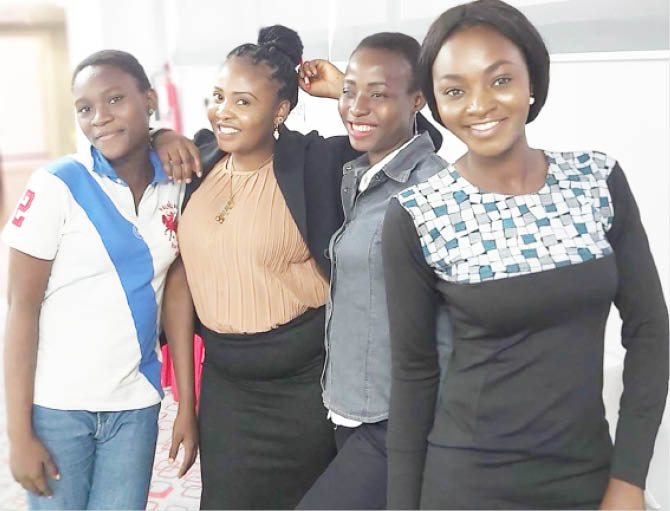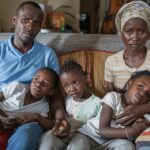Farida was stepping into a dangerous world. Peer pressure, curiosity, sex, drugs, teenage pregnancy, teenage crime, gang—anything was possible. At age 17 she joined a group called the “9ja Girls” in Kaduna.
She was just one girl in the group of 15-19-year-olds, learning what to do with her life and her health.
She was taking lessons in jelly and soap making as she turned 19 this year.
Then the coronavirus pandemic struck. Social distancing was in force, the lockdown was the norm.
“I still needed to keep in touch with 9ja Girls,” she says.
The group went virtual. A WhatsApp group was set up for life, livelihood and health skills classes. Her phone number was added to a database that sent out periodic information on COVID-19 and sexual and reproductive health via bulk SMS. The group linked with health providers, held question-and-answer sessions and browsed sexual and reproductive health information on a dedicated Facebook page. Group activities transitioned into one-on-one engagements with strict physical distancing.
9ja Girls is a system empowering and supporting girls and their communities towards improving sexual and reproductive health for adolescents through social and economic development.
The Adolescents 360 Project, centres on supporting knowledge, skills, and confidence to aspire and achieve life goals.
It wasn’t just in Kaduna, but also in Lagos, Ogun, Oyo, Osun, Edo, Delta and Nasarawa. The emergence of COVID-19 was causing huge disruptions to health services, and Farida’s group like so many others across the states of intervention was taking a hit.
Demand, access, supply and service delivery were all affected, says Nafisatu Isa, Reproductive Health Coordinator at the Kaduna State Primary Health Care Development Agency.
“Women have a problem of coming out to go to the facilities to access the services. As well, the service providers have difficulties going to the facilities to provide the services,” she says.
The “demand creators” who mobilised girls like Farida to health centres could not move about.
Health providers that are “to move out of their homes and to the facilities to provide the services are having problems,” Isa adds.
“Even if they get to the facilities, there is fear and anxiety between the service providers and the community where everybody is afraid of contracting COVID-19, and that also affected the services.”
And with the nation’s attention taken over by the coronavirus, supply of commodities for sexual and reproductive health dwindled and faced several delays to deliver commodities from national warehouses to those of states and local governments.
The lockdown has exposed the vulnerability of women and girls, and adolescent girls in particular. It isn’t just single adolescent girls like Farida.
Married adolescents are captured in a parallel project Matasa Matan Arewa. And maintaining their access is crucial.
One in every 10 Nigerians is aged 15 to 19, and nearly half of them are girls, according to data from the UN Population Fund.
More than four in 10 women are married by age 18, says the country’s latest Demographic Health Survey.
Among the 15-19-year-olds, one in five is already a mother or pregnant with her first child. And only 3.2% of married 15-19-year-olds use any method of contraception.
At least 19 in 100 girls begin sexual activity by age 15, and the proportion triples by age 18.
In the first six months of 2020 alone—with nearly three months of lockdown—pregnancy rates among teenagers doubled, says Fatima Muazu, programme assistant in the Adolescents 360 Project, implemented by the Society for Family Health, in Kaduna.
“It is like doubling what we had in 2019, and we are just in June,” she said last month during a media roundtable organised to discuss the impact and significance of COVID-19 on adolescents’ sexual and reproductive health in Kaduna State .
“The pandemic really has effect on the project implementation. We are trying to see how our adolescent girls can come in for contraception in order to avoid unintended and unplanned pregnancies, unsafe abortions, and for them to be able to achieve their goals. For the married ones, we expect there should be child spacing within their families for better health.”
The project had six months to go when COVID-19 struck. As states where it is implemented went into total or partial lockdown and prevention protocols were put up, “particularly physical distancing, it became impossible to carry out most 9ja Girls and Matasa Matan Arewa activities physically” says Muazu.
“Even when lockdown rules were relaxed, carrying out activities was still challenging.” Hence the adaptation of the project to “virtual platforms to accommodate the new rules and allow participants and beneficiaries to continue to enjoy the services they used to enjoy in their safe spaces.”
Part of the work of mobilisers in one-one-one interaction is to refer adolescents like Farida to health centres, where they are attended to by providers in protective gear.
The government-trained providers, then with support from partners procured protective gear so service providers and clients could be safe, says Isa.
The state is keeping track of its supplies for COVID-19. With 6,511 protective gowns by July 14, it estimates its present supply will run out in 100 days, according to Dr Neyu Iliyasu, director of the state’s primary health care development agency.
It comes down to sustaining services for adolescent girls—single and married. Single adolescents get left out because of religious and cultural sensitivities, says Isa, about the necessity of mainstreaming the project.
“With Matasan Matan Arewa, I know when we cover many married girls as possible most of the misconceptions and myths against provision of adolescent sexual-and reproductive-health delivery will reduce,” she says.
“So, the state is working towards that to see that we cover as many adolescents as possible with the support of the partners. That is the essence of us domesticating the adolescents policy in the state so that we will use the policy as backup to expand the services to as many adolescents as possible.”
Farida is only “happy for having that contact, keeping in touch” all through the lockdown, she says.
“I still chat on Facebook, WhatsApp and one-on-one contact. They are keeping me toward achieving my goals.”

 Join Daily Trust WhatsApp Community For Quick Access To News and Happenings Around You.
Join Daily Trust WhatsApp Community For Quick Access To News and Happenings Around You.


